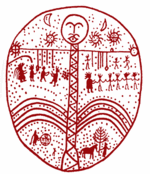Similar topics
"Paracelsus, the Man and His Natural Philosophy" -
Page 1 of 1
 "Paracelsus, the Man and His Natural Philosophy" -
"Paracelsus, the Man and His Natural Philosophy" -
See the Esoteric Coffee House for the complete article:


Paracelsus, the Man and His Natural Philosophy (I)
September 16th, 2009 by Jo Hedesan
There is hardly a more controversional figure in the history of ideas than Paracelsus, by his real name Theophrastus Bombast of Hohenheim (1493-1541). He was many things to many people: a hero to some, a quack to other, a devil’s doctor, a German nationalist or a drunkard. Perhaps he was all these things, because, by comparison to most other historical figures, he was impossible to frame. In fact, Paracelsus created a world of his own and a mythology that has never ceased to fascinate since his premature death at 47.
Inevitably, any scholarly analysis of Paracelsus is bound to reduce something from his larger-than-life self. Scholars simply do not have the tools to tackle his complexity. The same is the situation of his works. He wrote a wondrous amount, and another wondrous amount was added unto him by his faithful followers. Like a religious figure, he created a veritable ‘tradition’ of writings that were attributed to him. This huge compendium is still awaiting a contemporary analysis, despite efforts in this direction (notably Kurt Goldammer).
Paracelsus was a religious figure of sorts; many people called him ‘Lutherus Medicorum’, the Luther of physicians. He didn’t like it; even though he lived during the turmoil of Luther’s Reform, he remained a faithful, if unorthodox Catholic. Instead, he proposed his own version of the world, a peculiar mixture of natural philosophy, alchemy, magic and Christianity. He was in fact the quintessential representative of the Renaissance; a man convinced of his mission of reforming people’s views of the world and of Christianity. He believed there was no inherent contradiction between the analysis of the natural world (we now call this ‘science’) and religion; in fact, Christianity was the very basis of this analysis.

ankh_f_n_khonsu- Number of posts : 545
Registration date : 2008-09-15
 Similar topics
Similar topics» "Occultism and Philosophy in the Seventeenth Century"
» What are you currently reading?
» "Scholars Seek to Rescue Image of John Dee, Last Royal Wizard" -
» What are you currently reading?
» "Scholars Seek to Rescue Image of John Dee, Last Royal Wizard" -
Page 1 of 1
Permissions in this forum:
You cannot reply to topics in this forum
